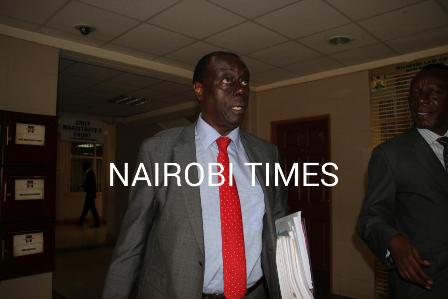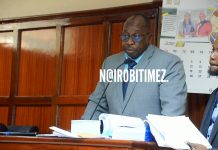Keroche Breweries Limited Lawyer Paul Muite leaving Milimani law courts after Justice George Odunga quashed a directive by President Uhuru Kenyatta ordering the destruction of second and third generation alcohols countrywide on January 15, 2016.
BY Nairobi Times Correspondent
The court has quashed a directive by President Uhuru Kenyatta ordering the destruction of second and third generation alcohols countrywide.
Justice George Odunga said, “In so far as the Presidential directive was made pursuant to Article 132(3) (b) of the Constitution the same were unconstitutional as it did not comply with the provisions of Article 135 of the Constitution. Accordingly the same, pursuant to Article 2(4) of the Constitution, is void and has no legal effect.”
He added that to avoid any doubt, any actions taken pursuant to the said directive are similarly unlawful and have no legal effect.
Alcohol manufacturers, distributors and retailers moved to court following a directive by President Kenyatta dated July 1 2015 ordering a crackdown on the production and sale of illicit liquor within the country.
It was contended that after the directive, CS Joseph Nkaissery drafted and enacted the Alcoholic Drinks Control (Supplementary) (Licensing) Regulations, 2015 which were fiercely opposed.
They said that the CS with no regard to the law donated unto himself powers that he did not possess, enacted regulations which were not debated or approved or passed by the relevant committee of the National Assembly.
The petitioners said that the regulations provided a blanket ban of certain ready to drink alcoholic drinks and beverages also referred to as second or third generation alcoholic drinks without defining what constitutes second or third generation drinks and/or the criteria for identifying the same.
“The respondents’ actions of July 3 2015, suspending with immediate effect without notice, the petitioners’ permits and licenses pending alleged investigation by some inter-agency government department amounted to unfair administrative action,” they said.
In response, CS Nkaissery stated that the regulations were prematurely challenged since they had not been subjected to the requisite requirements of public participation and parliamentary approval and thus the question of their conformity with the Statutory Instruments Act cannot arise.
“Besides, the involvement of personnel from all the concerned regulatory and the security agencies was necessary in order to inculcate trust from the public and among themselves in the wake of adverse perceptions of the earlier disjointed efforts at curbing illicit alcohol and lethal brews,” the CS said.
He added that the President was acting within his constitutional powers, responsibilities and duty under the constitution to direct government agencies to crack down illegal liquor which was becoming a health hazard and cause of many deaths.
CS Nkaissery said that the crackdown on illicit liquor should be devoid of any unlawfulness and destruction of private property and the petitioners had not demonstrated that they had reported to authorities any alleged destruction of property and the inaction of authorities.
Justice Odunga said that the purpose of the court is to ensure that the decision making process is done fairly and justly to all parties and blatant breaches of statutory provisions cannot be termed as mere technicalities by the respondent.
“The court is one of the inherent and unlimited jurisdiction and it is its duty to ensure that the law is followed…If a local authority does not fulfill the requirements of law, the Court will see that it does fulfill them and it will not listen readily to suggestions of “chaos” and even if the chaos should result, still the law must be obeyed,” the judge said.
He also quashed a decision made by Kenya Bureau of Standards cancelling all the petitioners’ permits and licenses transmitted vide the letter dated 3rd July, 2015.







